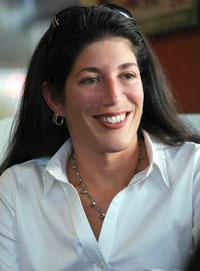Political Analyst Tackles #MeToo Workplace Issues
April 11, 2018

Natalie Cadarette, a student from the class, expressed appreciation that the long-overlooked topic was at the forefront of the discussion. “In the wake of the #Metoo movement, we must be knowledgeable and confident in how we react to something that for so long has been overlooked. The movement is bringing an end to the silence and is so important,” she said."The movement is bringing an end to the silence and is so important."
The #MeToo phenomenon, with its pattern of women speaking out for the first time about workplace sexual harassment and assault, has been a positive development, Braceras said, explaining that it has empowered women to confront misconduct with predatory men. “Stand up for yourselves,” Braceras said to the women both in class and in a well-attended lecture later in the day organized by the student group, Women of Isenberg.
Young female employees, Braceras stressed, should establish unambiguous social boundaries when sharing after-hour drinks with more senior males from the workplace. Earlier in her career, at a prominent Boston firm, Braceras periodically traveled as a duo with male fellow employees. The firm’s exemplary culture aside, “I still would have been happier traveling with a third person.” She advised female students to do the same: to avoid putting themselves in uncomfortable situations in the first place. “Propose meeting over lunch instead.” Or, for that matter, she said, invite a third person to come along.
The Problem with Human Resources
In the wake of decidedly inappropriate or injurious behavior by a male coworker or “boss,” should a female worker go to Human Resources (HR)? asked Johnson. “She should certainly tell people whom she trusts [that may include a mentor] and she should always document the incident or incidents in writing,” Braceras advised. “Document by sending an email to someone you trust. The more ways to document, the better.
"As CEO, you can tell managers your values and how to respond. You can set a tone as a leader."“The problem with HR,” Braceras continued, “is that their job is to protect the company. As an HR professional, you usually can’t just fire someone in response to a complaint. In HR, your role is to investigate, not assume.” Federal and state law, in fact, may protect the accused since it prohibits discrimination based not only on sex, but on race, ethnicity, disability, military service, and age (anyone over forty). If the alleged harasser falls into one of those categories, the firm becomes vulnerable to lawsuits based on discrimination. The bottom line: “HR has a different constituency and it’s not the victim.”
Physical violations, including the criminal extremes of sexual assault and rape, are usually straightforward under the law (for both, the victim should go to the police), but other varieties of misconduct have posed many grey areas under the law. For example, to qualify as a “severe case,” sexual harassment must be frequent enough to make work intolerable, Braceras observed. “Does the harasser have power over you?” she continued. “A superior [i.e., higher-level employee] represents the company; not a 25-year old male team member.” In other words, by virtue of his status, inappropriate behavior by the former would far more likely place the company itself at risk.
Shaping Company Culture
Sexual harassment laws, Braceras reiterated, derive from discrimination law. You need to prove discrimination based on sex. “But companies can have their own policies. The best way to protect the company is at the front end,” she said. As a CEO, you have the influence to shape a corporate culture by rejecting inappropriate contact by managers toward subordinates and prohibiting alcohol at gatherings. “As CEO, you can tell managers your values and how to respond. You can set a tone as a leader.” On the flipside, she added, “Leaders of toxic corporate cultures should step down.”
Owing to their size, small entrepreneurial companies, which are the subject of Johnson’s course, typically offer greater accountability and transparency, noted Braceras. With that said, Professor Johnson’s students left the lecture with a timely advisory: regardless of a potential employer’s size, get a handle on its culture before you sign on.
Natalie Cadarette concurs: “As a young female entering the business world, I pay a lot of attention to company culture. [It] has become not just something where we feel we belong and fit in, but something where we feel safe.”
Perhaps over time, students like Natalie Cardarette will play a role in shaping the company culture they would like to see.
Photo retrieved from featured guest's blog.